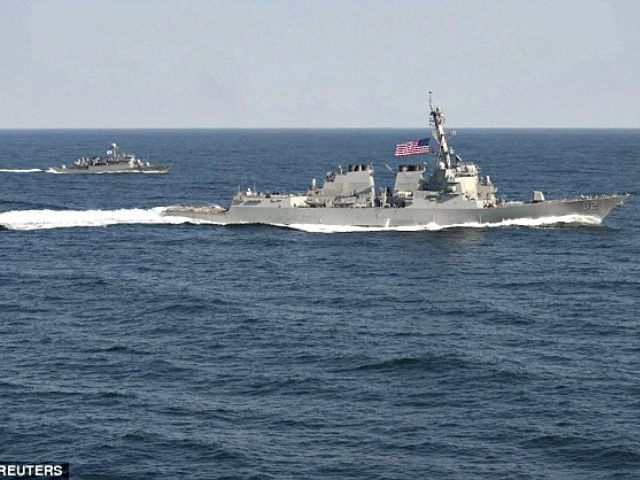As China expands its military presence in the international waters of the South China Sea, U.S. Pacific Command head Admiral Harry B. Harris is proposing that the United States join with Australia, India, and Japan in conducting operations in the region to keep Beijing from stretching its military muscle against its smaller neighbors.
“Exercising together will lead to operating together. By being ambitious, India, Japan, Australia and the United States and so many like-minded nations can aspire to patrol together anywhere international law allows,” Admiral Harris said Wednesday while on a visit to India to meet with his counterparts in the country.
The Sydney Morning Herald notes that Japan had proposed a similar measure in 2007, long before China began illegally constructing military facilities in the disputed Spratly and Paracel Islands, and there appears to be genuine interest in this coalition among the relevant countries.
Japan, in particular, has taken action to curb China’s expansion in the region by signing an agreement to sell military equipment to the Philippines, which claims much of the Spratly Islands and has taken the case to the Permanent Court of Arbitration at The Hague. China has vowed to disregard any verdict the court hands down.
Last week, The Philippine Star confirmed that Japan will be selling a variety of equipment to Manila, with surveillance aircraft the first item on the table. Radar and other surveillance equipment may be forthcoming.
Admiral Harris had especially kind words for the country hosting him, something The Washington Post is taking as an indication that America is seeking especially close ties with India, or at least aspiring to recruit India as a major military power into the South China Sea dispute as a counterweight to China.
“India, indeed, stands like a beacon on a hill, building a future on the power of ideas … not on castles of sand that threaten the rules-based architecture that has served us all so very well,” Harris said. American officials have in the past referred to China’s constructions in the region as “sand castles.”
Admiral Harris did not mention China during his remarks this time, instead warning that, without such joint exercises, large militaries could “bully smaller countries through intimidation and coercion.” The admiral has directly accused China of such activity in the past, however. Last month, he asserted that the United States would commit to engaging in more freedom of navigation exercises – intended to assert the right of any nation to travel through international waters – and “doing them with greater complexity in the future.” He added, “China’s intent to militarize the South China Sea is as certain as a traffic jam in DC.”
The Chinese government has been building numerous artificial islands on reefs in the Spratly and Paracel island chains and building landing strips for fighter jets on these. In the past month, satellite evidence has indicated that China has placed fighter jets and surface-to-air missiles in the region and begun construction on an advanced radar system. Malaysia, Brunei, Vietnam, the Philippines, and Taiwan all claim parts of the South China Sea on which China has begun construction.
“China must not pursue militarization in the South China Sea,” Secretary of Defense Ashton Carter warned on Tuesday in a separate event in San Francisco, echoing the warnings America has been sending Beijing for months on the matter. “Specific actions will have specific consequences.”
China has, nonetheless, taken specific actions in this case against the Philippines. On Wednesday, Chinese vessels expelled Philippine fishermen from the Jackson Atoll, widely regarded as Philippine territory and an oft frequented fishing group. Chinese ships chased the fishermen away, a move Beijing explained as necessary to aid a Chinese ship that had gotten stuck in the water. Chinese Foreign Ministry spokesman Hong Lei admitted that the Chinese ships “persuaded fishing boats to leave the waters in an effort to ensure safety conditions for normal navigation,” but he said that the Chinese ships have already left the area. “They might be back tomorrow, they may not,” Philippine Foreign Secretary Albert del Rosario asserted on Wednesday.

COMMENTS
Please let us know if you're having issues with commenting.